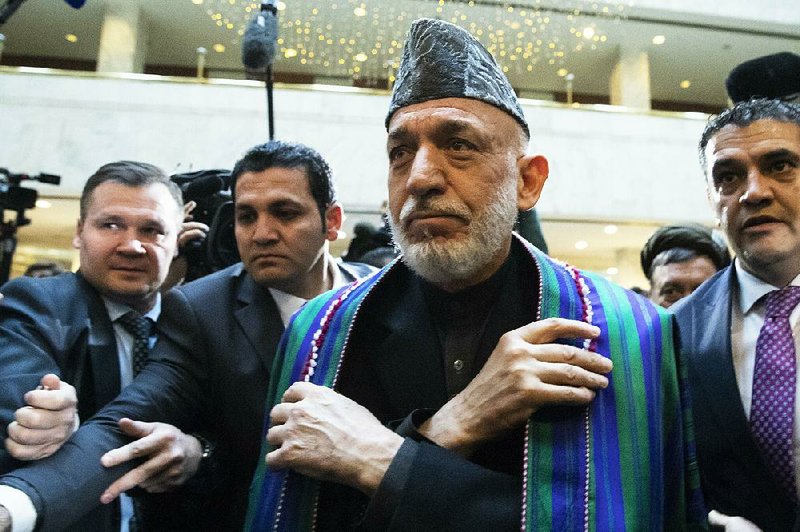KABUL, Afghanistan -- The Taliban launched a pre-dawn attack on an army base in northern Afghanistan on Tuesday, killing 26 members of the security forces, a provincial official said, the latest brazen assault by insurgents amid stepped-up efforts to resolve the country's protracted war.
The raid on the base in northern Kunduz province came as representatives of the Taliban were to hold meetings in Moscow with prominent Afghan figures, including former President Hamid Karzai, opposition leaders and tribal elders -- but not Kabul government officials.
The insurgents have refused to negotiate with Afghan President Ashraf Ghani's government, calling it a U.S. puppet. The Taliban have been staging near-daily attacks, inflicting heavy casualties on the embattled Afghan army and security forces. Both sides in the conflict say they want to strike hard militarily to bolster their position at the negotiating table.
In the Kunduz attack, the Taliban stormed the base, located on the outskirts of the provincial capital, Kunduz city, around 2 a.m., said Mohammad Yusouf Ayubi, head of the provincial council. There were at least 23 soldiers and three members of the local police force among those slain.
According to Ayubi, 12 troops were wounded in the Taliban onslaught, which lasted for more than two hours until reinforcements arrived at the besieged base and the attackers were repelled.
"Day by day, the security situation is getting worse in and around Kunduz city," said Ayubi, adding there are fears the city could again fall into the hands of the Taliban as it did briefly on two occasions in recent years -- in September 2015 and in October 2016.
Taliban spokesman Zabihullah Mujahid issued a statement to the media saying the Taliban were behind the Kunduz attack, claiming the insurgents had overrun three police checkpoints as the attack unfolded.
Far from the Afghan war zone, a two-day meeting in the Russian capital between the Taliban and Afghan figures, which started Tuesday, is seen as another step in a process aimed at resolving the 18-year war. That process has accelerated since the appointment last September of U.S. peace envoy Zalmay Khalilzad.
But the talks included no representatives of Ghani's government, inviting fierce criticism from the American-backed Afghan leader.
"A peace deal with the Taliban will not be implemented unless there is a nationwide consensus," Ghani said, adding that any agreements made without the Afghan government were meaningless. "Let hundreds of such meetings be held."
This did not stop some prominent Afghan politicians, such as Mohammad Mohaqiq, deputy to the government's chief executive, from attending the intra-Afghan talks, but they did so in an independent capacity.
The Taliban's chief negotiator, Mohammad Abbas Stanekzai, detailed how he saw the country's future once the war eventually comes to an end.
Stanekzai departed from previously vague messages about the Taliban's stance on women. Treatment of women under the group's reign, when they were denied the most basic of rights, drew worldwide scorn.
Stanekzai said women should be given the rights granted under Islam -- access to work, education, property rights and the ability to choose one's own husband. He blamed Western television shows and women's rights activists for the challenges Afghan women face.
"The Islamic Emirate is committed to eliminating all those evil customs and traditions that violate women's rights and do not comply with Islamic principles," he said, using the name the Taliban calls itself.
Fawzia Koofi, a member of the Afghan Parliament and one of two women present, said she received a cool reception from Taliban officials when she pressed them on women's rights during meetings in Moscow.
"We clearly told them we need assurances on the future of Afghan women. We told them how far we have come, and that we will not go back, we will not reverse," Koofi said. "They were quiet. Let's see what comes. This is just the beginning; it's a warm-up."
The Taliban also want to scrap the nation's constitution, which Stanekzai described as having been "copied from the West and imposed on Afghanistan's Muslim society under the shadow of occupation." Instead, a new one should be drawn up, adhering to "Muslim principles" and a sense of national achievements, he said.
Information for this article was contributed by Rahim Faiez and Nataliya Vasilyeva of The Associated Press; and by Amie Ferris-Rotman and Sayed Salahuddin of The Washington Post.
A Section on 02/06/2019
